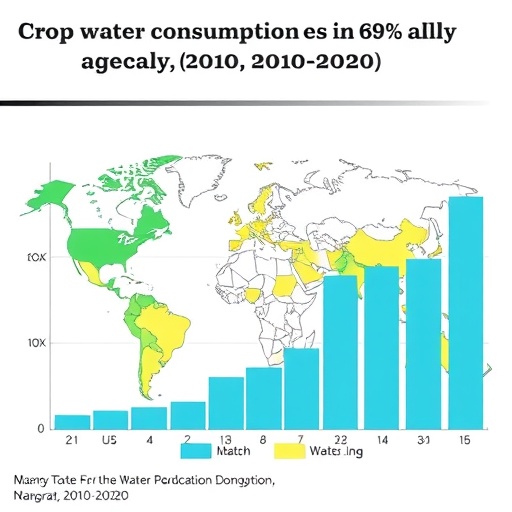In an alarming revelation, recent studies have indicated a significant increase in global crop water consumption over the past decade. Research conducted by Chukalla, Mekonnen, Gunathilake, and their team has demonstrated that water usage for 46 key agricultural crops surged by 9% from 2010 to 2020. As we approach an era where water scarcity presents a serious challenge for global agriculture, understanding the dynamics of crop water consumption is crucial for sustainable food production.
The study meticulously analyzed water consumption patterns across diverse agricultural settings, providing a granular perspective on how water resources are allocated to different crops worldwide. The researchers utilized advanced modeling techniques, powered by Geographic Information Systems (GIS), to visualize crop water consumption spatially and temporally. This level of detail not only sheds light on demand trends but also aids policymakers in strategizing for efficient water management.
In the context of climate change, increased crop water consumption raises several red flags. Rising temperatures and shifting precipitation patterns can exacerbate water stress, further complicating agricultural practices. The study concluded that the attributes influencing an increase in water consumption include both climatic factors and human interventions, such as irrigation. These changes necessitate urgent discussions surrounding agricultural policies to ensure that food production does not come at the expense of finite water resources.
The implications of this 9% increase in water consumption are significant. Many regions around the world are already facing water shortages, and as crop demands rise, these pressures will only intensify. The research suggests that a reevaluation of irrigation practices and crop choices is essential for future sustainability. Innovative techniques, such as deficit irrigation and the use of drought-resistant crop varieties, may offer viable solutions for reducing overall water demand.
Furthermore, the study underscores the importance of integrated water management in agriculture. Stakeholders from various sectors—agricultural producers, policymakers, environmentalists—must collaborate to develop comprehensive plans that address water allocation and sustainable farming practices. This collective approach can enhance the resilience of agricultural systems amidst uncertainties posed by climate variability.
The rise in crop water consumption also poses economic considerations. Increased irrigation demands could lead to higher operational costs for farmers, particularly in water-scarce regions where water prices may rise. This financial strain could adversely impact smaller farmers who may already be vulnerable to market fluctuations. The study’s insights could guide initiatives aimed at promoting equitable access to water resources for all farmers, irrespective of their scale of operation.
As the research highlights, not all agricultural crops have the same water consumption profiles. For instance, water-intensive crops such as rice and cotton tend to dominate overall consumption figures. This discrepancy emphasizes the need for strategic crop selection aligned with local water availability. By shifting towards less water-dependent crops, regions can alleviate some of the pressures on their water resources while still maintaining productivity and profitability.
The findings of the study are particularly pertinent given the increasing global population, projected to reach nearly 10 billion by 2050. As food demand grows, so too will the competition for water resources. Addressing this challenge requires innovative agricultural practices that enhance water efficiency without compromising yield. The research team advocates for investing in agricultural technology that promotes precision agriculture, allowing farmers to optimize water use while catering to crop needs more effectively.
Moreover, the research sparks discussions on the role of policy reforms in ensuring sustainable water use in agriculture. Current agricultural policies may often prioritize increased production at the expense of environmental considerations. As such, there is an urgent need for a paradigm shift, emphasizing sustainability and water conservation within agricultural frameworks at both national and global levels.
In light of these findings, the role of education and outreach cannot be overstated. Farmers must be equipped with the knowledge and tools required to implement sustainable practices effectively. Extension services can play a pivotal role in disseminating information regarding water management strategies, fostering a culture of sustainability among agricultural communities.
In parallel, the research highlights the contribution of technological advancements in addressing water challenges. From efficient irrigation technologies to data analytics for monitoring water usage, leveraging modern tools can significantly enhance crop water management. The study calls for further exploration into how technology can be harnessed to improve water efficiency across various agricultural systems, thereby ensuring food security while preserving water resources for future generations.
As the global agricultural landscape evolves in response to these challenges, international collaboration will undoubtedly be critical. Countries can benefit from sharing best practices and resources, learning from one another’s successes and failures in managing agricultural water consumption. Workshops, forums, and conferences can serve as platforms for knowledge exchange, nurturing a global community committed to sustainable agriculture and responsible water use.
Ultimately, whether through policy change, technological innovation, or educational initiatives, addressing the rise in crop water consumption is imperative. The implications of continuing on the current trajectory could be devastating, not only for farmers but also for global food security and the environment. As we stand at the crossroads of agricultural advancement and ecological responsibility, now is the time for decisive action.
Subject of Research: Crop water consumption patterns from 2010 to 2020.
Article Title: Global spatially explicit crop water consumption shows an overall increase of 9% for 46 agricultural crops from 2010 to 2020.
Article References:
Chukalla, A.D., Mekonnen, M.M., Gunathilake, D. et al. Global spatially explicit crop water consumption shows an overall increase of 9% for 46 agricultural crops from 2010 to 2020.
Nat Food (2025). https://doi.org/10.1038/s43016-025-01231-x
Image Credits: AI Generated
DOI:
Keywords: Crop water consumption, sustainable agriculture, climate change, water management, food security.




